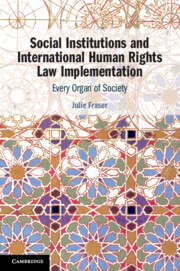Book contents
- Social Institutions and International Human Rights Law Implementation
- Social Institutions and International Human Rights Law Implementation
- Copyright page
- Dedication
- Contents
- Foreword
- Acknowledgements
- 1 Introduction: The Challenge of Human Rights Implementation
- 2 Human Rights and Their Cultural Connection
- 3 Domestic Implementation of International Human Rights Treaties: Legislative and Other Effective Measures
- 4 Domestic Implementation of International Human Rights Treaties: The Role of Public and Private Actors
- 5 Role of Islamic Law and Institutions in Implementing Women’s Right to Family Planning in Indonesia
- 6 Conclusions: Social Institutions and the Future of Domestic Human Rights Implementation
- Select Bibliography
- Index
6 - Conclusions: Social Institutions and the Future of Domestic Human Rights Implementation
Published online by Cambridge University Press: 04 September 2020
- Social Institutions and International Human Rights Law Implementation
- Social Institutions and International Human Rights Law Implementation
- Copyright page
- Dedication
- Contents
- Foreword
- Acknowledgements
- 1 Introduction: The Challenge of Human Rights Implementation
- 2 Human Rights and Their Cultural Connection
- 3 Domestic Implementation of International Human Rights Treaties: Legislative and Other Effective Measures
- 4 Domestic Implementation of International Human Rights Treaties: The Role of Public and Private Actors
- 5 Role of Islamic Law and Institutions in Implementing Women’s Right to Family Planning in Indonesia
- 6 Conclusions: Social Institutions and the Future of Domestic Human Rights Implementation
- Select Bibliography
- Index
Summary
Finally, Chapter 6 draws on the book’s analysis to make conclusions and recommendations designed to improve the effectiveness of domestic human rights implementation. These recommendations regarding social institutions are directed primarily towards states parties to international human rights treaties, as well as to the UN treaty bodies. It urges a shift in the international discourse on culture and human rights, a more creative approach to implementation measures, and greater scope for non-state actors. The chapter situates this analysis in the present context of globalisation, the rise of privatisation and the changing role of the state. It also looks ahead to projections of increasing religiosity and to Islam becoming the world’s largest religion. The chapter explores the broader application of the book’s main contention and its thematic connection to other scholarship on human rights narratives and challenges to state-centricity.
Keywords
- Type
- Chapter
- Information
- Social Institutions and International Human Rights Law ImplementationEvery Organ of Society, pp. 268 - 292Publisher: Cambridge University PressPrint publication year: 2020

